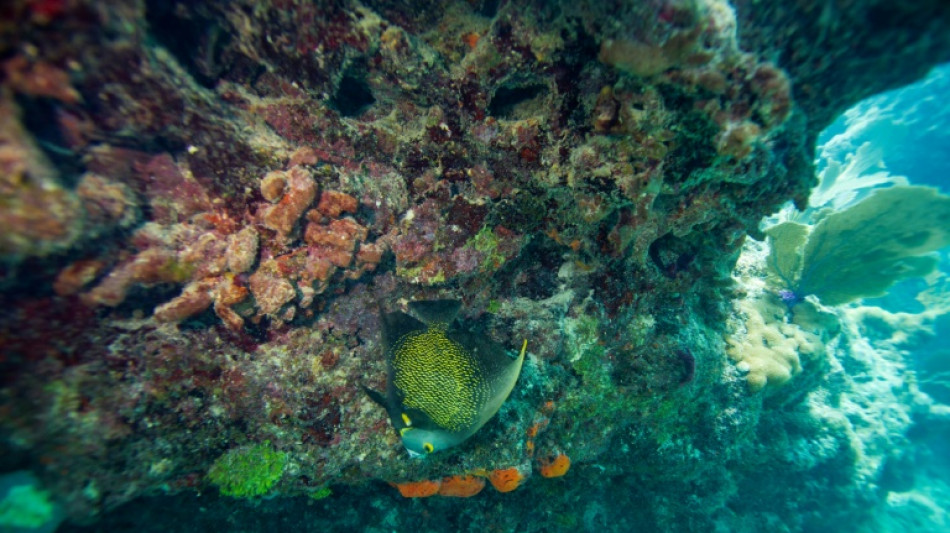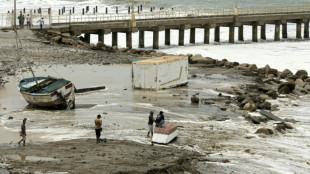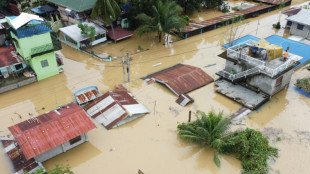
-
 Five events to look out for in 2025
Five events to look out for in 2025
-
Five sports stars to watch in 2025

-
 Plane with 181 on board crashes in South Korea, killing 29
Plane with 181 on board crashes in South Korea, killing 29
-
UNESCO-listed musical instrument stifled in Afghanistan

-
 Excited Osaka says 'deep love' of tennis keeps her going
Excited Osaka says 'deep love' of tennis keeps her going
-
Baseball superstar Ohtani expecting first baby

-
 For German 'sick leave detective', business is booming
For German 'sick leave detective', business is booming
-
Konstas, Khawaja fall as Australia extend lead to 158 over India

-
 Impressive Herbert leads Chargers into playoffs, Broncos denied
Impressive Herbert leads Chargers into playoffs, Broncos denied
-
One dead in Ecuador, Peru ports closed amid massive waves

-
 NBA hand out suspensions after fracas in Phoenix
NBA hand out suspensions after fracas in Phoenix
-
Atalanta snatch late draw at Lazio to hold Serie A lead

-
 Trump sides with Musk in right-wing row over worker visas
Trump sides with Musk in right-wing row over worker visas
-
Suriname rules out state funeral for ex-dictator Bouterse

-
 Alisson tells title-chasing Liverpool to create own history
Alisson tells title-chasing Liverpool to create own history
-
Israel army says ends raid against 'Hamas centre' in north Gaza hospital

-
 French skier Sarrazin 'stable' after surgery for crash injuries: federation
French skier Sarrazin 'stable' after surgery for crash injuries: federation
-
Israeli military confirms north Gaza hospital chief held in raid

-
 Abbas, Shahzad rock South Africa at start of chase
Abbas, Shahzad rock South Africa at start of chase
-
US deported record 61,680 Guatemalans in 2024: agency

-
 Double centurion Shah inspires Afghanistan fightback in Zimbabwe
Double centurion Shah inspires Afghanistan fightback in Zimbabwe
-
Diallo wants to make 'history' with struggling Man Utd

-
 Putin apologises to Azerbaijan without claiming responsibility in plane crash
Putin apologises to Azerbaijan without claiming responsibility in plane crash
-
Guardiola won't quit troubled Man City

-
 Gaza child amputees get new limbs but can't shake war trauma
Gaza child amputees get new limbs but can't shake war trauma
-
Evergreen Brignone powers to Semmering giant slalom win

-
 Thousands in Georgia human chain as pro-EU protests enter 2nd month
Thousands in Georgia human chain as pro-EU protests enter 2nd month
-
Turkey's pro-Kurd party meets jailed PKK leader

-
 WHO chief says narrowly escaped death in Israeli strikes on Yemen airport
WHO chief says narrowly escaped death in Israeli strikes on Yemen airport
-
Swiss Monney takes maiden World Cup win in Bormio downhill

-
 De Minaur wins but Australia crash to Argentina at United Cup
De Minaur wins but Australia crash to Argentina at United Cup
-
EU universal charger rules come into force

-
 Evenepoel targets return in time for Ardennes classics
Evenepoel targets return in time for Ardennes classics
-
Duffy bowls New Zealand to T20 victory over Sri Lanka

-
 Turkey's pro-Kurd party to meet jailed PKK leader on Saturday
Turkey's pro-Kurd party to meet jailed PKK leader on Saturday
-
Gaza hospital shut after Israeli raid, director held: health officials

-
 Surgery for French skier Sarrazin 'went well': federation
Surgery for French skier Sarrazin 'went well': federation
-
Mitchell, Bracewell boost New Zealand in Sri Lanka T20

-
 Kyrgios says tennis integrity 'awful' after doping scandals
Kyrgios says tennis integrity 'awful' after doping scandals
-
S. Korean prosecutors say Yoon authorised 'shooting' during martial law bid

-
 Vendee Globe skipper Pip Hare limps into Melbourne after dismasting
Vendee Globe skipper Pip Hare limps into Melbourne after dismasting
-
Reddy's defiant maiden ton claws India back into 4th Australia Test

-
 Doubles partner Thompson calls Purcell doping case 'a joke'
Doubles partner Thompson calls Purcell doping case 'a joke'
-
Reddy reaches fighting maiden century for India against Australia

-
 Sabalenka enjoying 'chilled' rivalry with Swiatek
Sabalenka enjoying 'chilled' rivalry with Swiatek
-
Political turmoil shakes South Korea's economy

-
 New mum Bencic wins first tour-level match since 2023 US Open
New mum Bencic wins first tour-level match since 2023 US Open
-
'Romeo and Juliet' star Olivia Hussey dies aged 73

-
 Brown dominates as NBA champion Celtics snap skid
Brown dominates as NBA champion Celtics snap skid
-
Indian state funeral for former PM Manmohan Singh

| RBGPF | 100% | 59.84 | $ | |
| CMSD | -0.67% | 23.32 | $ | |
| SCS | 0.58% | 11.97 | $ | |
| GSK | -0.12% | 34.08 | $ | |
| NGG | 0.66% | 59.31 | $ | |
| BTI | -0.33% | 36.31 | $ | |
| BCC | -1.91% | 120.63 | $ | |
| CMSC | -0.85% | 23.46 | $ | |
| RELX | -0.61% | 45.58 | $ | |
| AZN | -0.39% | 66.26 | $ | |
| RIO | -0.41% | 59.01 | $ | |
| BCE | -0.93% | 22.66 | $ | |
| RYCEF | 0.14% | 7.27 | $ | |
| VOD | 0.12% | 8.43 | $ | |
| JRI | -0.41% | 12.15 | $ | |
| BP | 0.38% | 28.96 | $ |

Florida coral reef still struggling after 2023 heat wave
Coral reefs off the Florida Keys islands are struggling to recover from last summer's record-breaking heat wave, new data showed Thursday, in another sign of the devastating impacts of human-caused climate change.
The state's southern waters experienced hot tub-like conditions with temperatures in July briefly topping 100 degrees Fahrenheit (37.8C) in Manatee Bay.
Coral, marine invertebrates made up of individual animals called polyps, have a symbiotic relationship with the algae that live inside their tissue and provide their primary source of food.
When the water is too warm, coral expel their algae and turn white, an effect called "bleaching" that leaves them exposed to disease and at risk of dying off.
A team of National Oceanic and Atmospheric Administration (NOAA) researchers carried out a scientific mission to assess the heat wave's impacts, surveying 64 locations at five of the major reefs that make up most of the state's 255-mile- (410 kilometer-) long barrier reef, which is home to sea turtles, stingrays, sharks, dolphins, grouper and many more species of fish.
They found less than 22 percent of approximately 1,500 staghorn coral (Acropora cervicornis) -- a species that is listed as a candidate for endangered species protections -- remained alive.
Among the five reefs surveyed, living elkhorn coral (Acropora palmata), which is listed as threatened throughout its range, was found only at three sites.
"The findings from this assessment are critical to understanding the impacts to corals throughout the Florida Keys following the unprecedented marine heat wave," said NOAA's Sarah Fangman.
"They also offer a glimpse into coral's future in a warming world," she continued, adding the work would inform ongoing restoration efforts.
NOAA is leading an initiative to restore nearly 3 million square feet (280,000 square meters) of coral reef, the equivalent of more than 50 American football fields -- through growing and transplanating corals.
Florida's coral reefs are vital not just to their wider ecosystem but also for the state's tourism and recreation industries. But their health has been declining since the 1970s due to the impact of human activities, hurricanes, heat-induced bleaching and disease.
C.Amaral--PC




